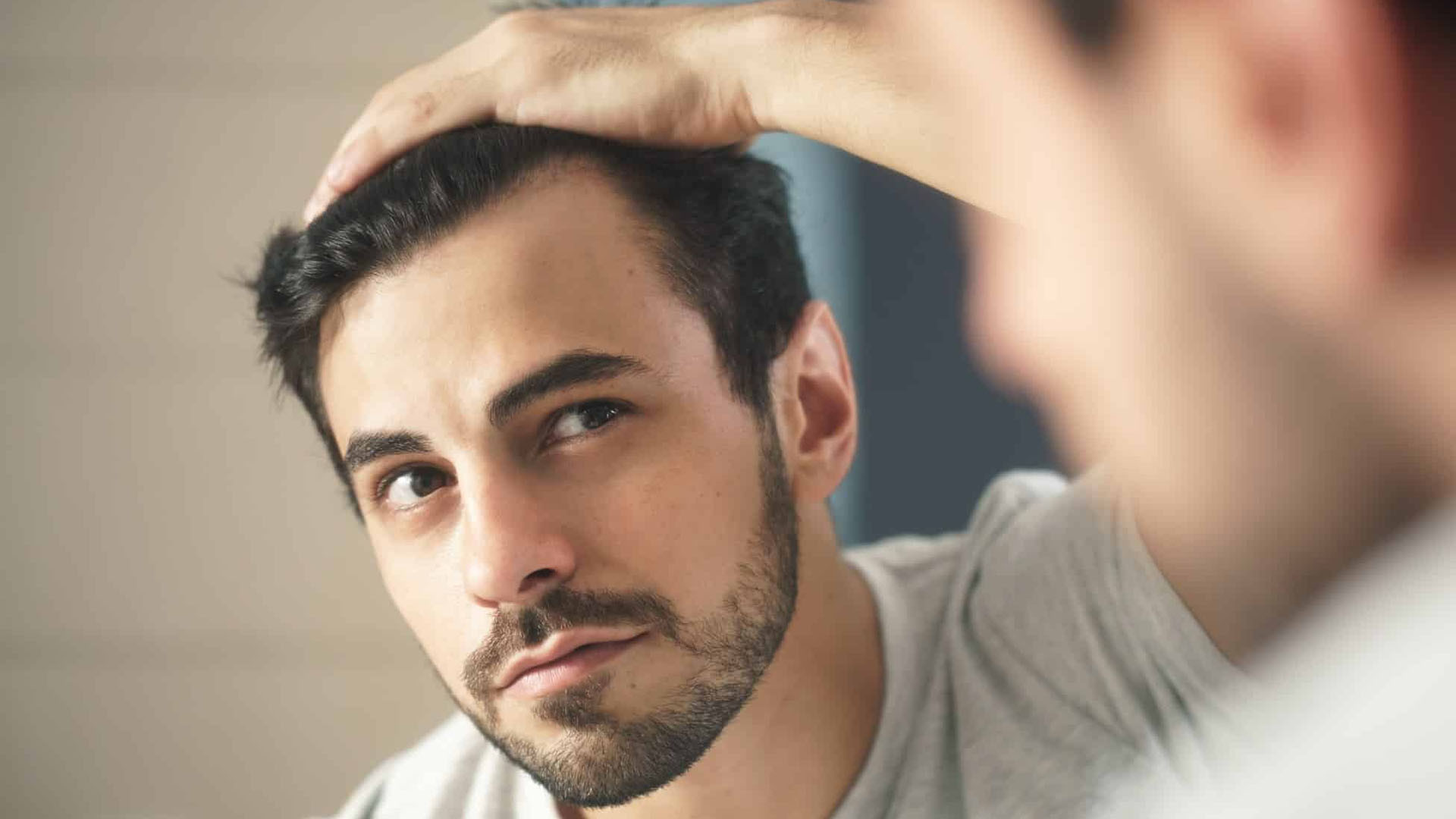Can COVID-19 Cause Hair Loss?
People infected with COVID-19 can have a variety of symptoms, with hair loss being described as a symptom in those who have recovered from the condition. Hair loss is a potential long-term adverse effect of COVID-19 that is presently being researched, according to the Centers for Disease Control and Prevention (CDC).
You may lose up to 100 strands of hair every day. However, if you are shedding hair that is not being replenished properly by new hair growth, or if you are losing more than 100 strands of hair every day, you may have a medical or hair loss issue. This article covers if a SARS-CoV-2 infection might cause hair loss and when you should discuss it with your doctor.
Related: Kādā vecumā veikt matu transplantāciju?
COVID-19 and hair loss research
According to multiple research, several occurrences of hair loss have been recorded following COVID-19 exposure. A group of 63 participants was investigated in a November 2020 study. 14 of the 58 individuals in the research reported hair loss. The average period between the beginning of COVID-19 symptoms and the appearance of noticeable hair loss was 58.6 days. Hair loss was resolved in 5 of the 14 patients. However, 9 of the individuals were still dealing with hair loss issues.
Related: Matu atjaunošana: kā atjaunot matu līniju?
How can COVID-19 cause hair loss?
The hair loss caused by COVID-19 is said to be a common indication of a disorder known as telogen effluvium (TE). Hair often comes out in large clumps, affecting less than half of the scalp. The condition usually lasts 6 to 9 months, after which most patients notice that their lost hair regrows.
This disorder is thought to be related to COVID-19. One of the most likely causes of TE is a serious sickness accompanied with a fever. Fever is said to be one of the most prevalent symptoms of a COVID-19 infection.
Hair loss caused by stress
Stress is another probable cause of TE. Patients suffering from an illness like COVID-19 are obviously under a great deal of physical and mental stress. Doctors think that the physical and mental stress associated with a COVID-19 infection may cause TE in patients. Stress causes an increase in the number of hair follicles to enter the telogen phase of the hair growth cycle, resulting in hair loss. Furthermore, the stress of the epidemic and quarantine are probable causes of TE.
Related: Matu transplantācija: cik ilgi saglabājas pārstādītie mati?
The TE Mechanism
TE occurs when a stressor causes numerous hair follicles to cease developing and enter the resting (telogen) phase. Hairs rest in the telogen phase for 2 to 3 months before being removed from your scalp to make place for future hair production. As a result, hair loss caused by TE happens a long time after a triggering event, such as an illness or a very stressful circumstance, has happened.
Related: Vai ar vienu matu pārstādīšanas procedūru pietiek uz visu mūžu?
Is hair loss linked to severe COVID-19?
Hair loss is most likely associated with a severe type of COVID-19 infection. However, the gravity and scope of this link have yet to be determined.
A study published in May 2020 looked at 175 people who had been hospitalized with coronavirus. The researchers revealed that a sizable proportion of the individuals (67%) had androgenic alopecia. However, this was not a randomized controlled trial.
In a July 2020 research, the balding patterns of 336 men hospitalized with COVID-19 and 1,605 men hospitalized without COVID-19 were compared. According to the findings of the study, males with the most apparent baldness patterns were more likely to test positive for COVID-19.
Related: FUE matu transplantācija
Managing Hair Loss
Instead of the normal 100 hairs lost each day, telogen effluvium can result in a loss of over 300 hair strands every day for up to 6 months, creating tremendous misery and stress. The good news is that telogen effluvium is just temporary and that hair will return. However, it may take some time. Because hair grows slowly, it is predicted that it will take 6 months to a year for your hair to restore its volume and length. Patients suffering with a Coronavirus should be relieved to hear that this condition is just temporary and that their hair will grow back as their illness and symptoms lessen. They should also adopt some healthy lifestyle modifications to maintain a healthy body and hair.
Related: Kādas ir labākās matu izkrišanas ārstēšanas iespējas?
Treatments for hair loss
Here are some home treatments that might help you keep your hair healthy and avoid damage to your hair follicles.
Changes in lifestyle:
- Quit smoking and drinking.
- Maintain regular eating and sleeping patterns, as well as a well-balanced, nutrient-rich diet.
- Never take any bogus hair growth pills.
- Perms, hot-oil treatments, and hairstyles that pull or damage your hair should be avoided.
When brushing your hair, avoid pulling or yanking it too hard.
Rogaine (minoxidil): Both men and women can take it to help regenerate hair or treat hair loss. In retailers, it is available as shampoo, liquid, or foam.
Devices: Home cures for hair loss include microneedling devices and laser combs or caps.
Alternative therapies: Here are a few examples of alternative hair loss treatments:
- The amino acids
- D-calcium palmitate
- Omega-3 fatty acids
- Onion puree
- Rosemary essential oil
- Palmetto (Saw Palmetto)
However, before taking any supplements or using any technologies to prevent hair loss, it is essential to contact with your doctor.
Related: Kādas ir labākās matu izkrišanas procedūras vīriešiem?
When should you see a doctor?
Hair loss can be a symptom of one or more serious health issues that should be detected and treated as soon as possible. If you have any of the following symptoms, you should see your doctor or a hair loss expert.
People infected with COVID-19 can have a variety of symptoms, with hair loss being described as a symptom in those who have recovered from the condition. Hair loss is a potential long-term adverse effect of COVID-19 that is presently being researched, according to the Centers for Disease Control and Prevention (CDC). You may lose up to 100 strands of hair every day.
However, if you are shedding hair that is not being replenished properly by new hair growth, or if you are losing more than 100 strands of hair every day, you may have a medical or hair loss issue. This article covers if a SARS-CoV-2 infection might cause hair loss and when you should discuss it with your doctor.







